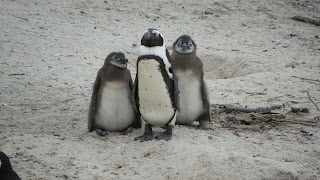 |
| Penguin. |
African
penguins or black-footed penguins, standing at about 60 cm tall, are medium in size and the only penguin species found on the African
continent. They are also referred to as ‘jackass penguins’ due to their
donkey-like bray sound, although several related species of penguins in South
America make the same sound.
These aquatic birds are flightless and
have stream lined bodies and stiffened wings, that aid in swimming and diving.
They have a thick, black band that has a close resemblance to an upside down
horse shoe and a pattern of unique, black spots on their chest. Their feet are
black and their faces are fitted with a black mask, with distinctive pink
patches of skin above both eyes. The pink glands help to cope with shifting
temperatures; as the temperature rises, the African penguins body sends more
blood to the glands which in turn cools the air surrounding the glands and
which turns to a darker shade of pink.
Those that roam
the sea after penguins as a meal, are sharks and the Cape fur seals. On land
penguins have to be on the look-out for mongoose, domestic cats, caracals and
big birds who steal their eggs and snatch up their chicks. If not caught by a
predator African penguins can live up to 15 years in the wild.
 |
| Penguin colony at Boulders Beach. |
Habitat
The African penguin is only found on the south-western coast
of Africa and on various inshore islands along Namibia and South Africa. These
quirky and amusing African penguins can be found living in a part along the
rocky and bushy coastline within False Bay.
Situated
on the edge of Simons Town is Boulders Beach, which is home to over 2 500
endangered African penguins. They can be seen waddling up and down the beaches
wearing their 'tuxedos', and entering the water to catch some food or take a
dip.
Behaviour
Although African penguins are somewhat
clumsy on land they are graceful and skilful swimmers in water, capable of reaching
speeds up to 24 kilometres (15 miles) per hour. Unlike most aquatic birds,
African penguins use their wings rather than feet to swim, which have been
altered to form highly capable flippers. They make use of their webbed feet
when swimming on the surface of water and their heavy bones enable them to
dive.
African penguins are social birds that live
in large and noisy families referred to as colonies. During the day they swim
out to sea in search of food but by nightfall arrive back to their colonies and
huddle together.
 |
| Two adult penguins. |
These penguins are considered one of the calmest
species of penguins in the world. Viewing areas are located in Boulders Bay
allowing people to get close to them in their natural environment without fear
of an attack.
Diet
African penguins swim out to the open sea, where they dive to depths of 30 metres to catch fish and squid and travel
between 30 to 70 km during a trip. However, when penguins have their young to
feed, the distance they travel from the breeding colony is limited. They also
eat small fish found swimming near the surface of the water.
Reproduction
African penguins form monogamous pairs for
life within breeding colonies, that raise a clutch of two eggs each year together,
while the female remains fertile for up to 10 years. There is no set breeding
season but nesting usually peaks from March to May across breeding sites such
as Boulders Bay. The two eggs are laid in burrows in guano (penguin faeces) or in sand under
boulders and amongst bushes. Incubation of the eggs takes about 40 days during
which the eggs are protected and incubated by both parents. Once the chicks are
born, at least one parent guards them until they reach 30 days of ages, after
which the chicks join a play school with other chicks while parents head out to
sea in search of food.
 |
| Adult penguin with two young penguins. |
Chicks leave the nest between the ages of
60 to 130 days depending on factors such as the
Did you know?
They are able to hold their breath on average
for about 2.5 minutes during a dive.
They are a protected species but are
sometimes harmed in oil spills off the coast of Africa.

No comments :
Post a Comment